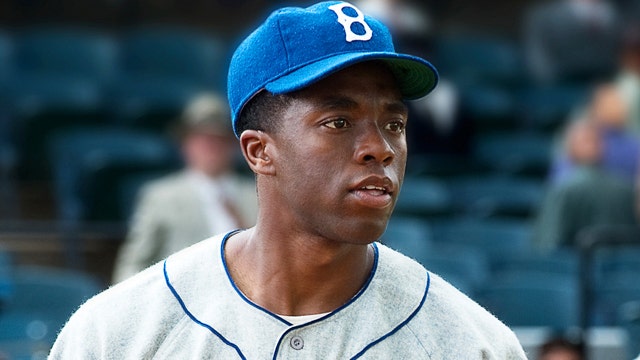Jackie Robinson biopic '42' a home run or strikeout?
Ashley Dvorkin and Justin Craig play ball with Jackie Robinson biopic '42,' Lindsay Lohan-Charlie Sheen dynamic duo in 'Scary Movie 5' and Ben Afflect in 'To the Wonder'
NEW YORK – “42” is an old-fashioned inspirational and ultimately uplifting drama about perseverance in the face of turbulent opposition. And the greatest credit to writer-director Brian Helgeland is that none of this is shown through grand melodramatic movie monologues, but through the simple restraint of Chadwick Boseman's portrayal of a determined and resilient Jackie Robinson.
In “42,” baseball speaks much louder than words.
Undeniable talent has no color and it's with that idea that Branch Rickey (Harrison Ford) brings Jackie Robinson up from the Negro leagues to be the first African American ball player in Major League Baseball. Talent plus dollar signs for a financially dwindling franchise, that is.
Jackie brings with him a unique style of playing, specifically stealing bases and out-gunning the pitcher. Being the only black player in the major leagues, Jackie faces opposition around every corner and every base. His own teammates petition to remove him and he also faces disgusting racial slurs from opposing team players and coaches. Alan Tudyk (“Firefly”), for example, delivers a raw performance as the racist Phillies coach who brings Jackie to the brink of self-destruction. Yet it’s through the game itself that Jackie can break through those barriers.
While Helgeland doesn’t necessarily sugar-coat the darker moments of the film, “42” does feel more like a Frank Capra version of history with everything nicely wrapped in a comfortable soft blanket. Though, by giving the film that Capra-esque feel, Helgeland really accentuates the hero aspect and Jackie Robinson’s immortalization. Helgeland is inadvertently reminding the audience during this oversaturated comic book hero phase that there are indeed real life super heroes.
This could have easily slipped into melodrama but Helgeland keeps a firm grasp on the reins. There is an incredible amount of restraint from all the actors, especially Ford and Boseman. During an early moment in the film, Branch Rickey warns Jackie that he will be verbally abused and coaxed into fights by players and fans, but to never, ever indulge or fight back. Without restraint, the white population will immediately end any and all chances of having black players in major league baseball.
It’s that restraint which really makes this a breakout performance for Boseman. We can see the emotions boiling inside Jackie during every confrontation and Boseman effortlessly works that inner struggle. It’s a quiet but satisfying performance and one hard to peel your eyes from.
Then there’s Harrison Ford, who sheds his movie star persona and slips nicely into a character unlike any he’s ever played. His Branch Rickey begins almost as a caricature of an old-timey, cigar-chomping clubhouse exec, but as the film progresses his curmudgeonly, but affable, performance feels truly genuine. Ford never overplays his hand and proves that he is well-suited for these more nuanced, character-driven roles.
Also nicely rounding out the “42” team are Nicole Behari, Andre Holland, Christopher Meloni and a rousing score by Mark Isham.
On the technical side, “42” features some really fantastic game-play shots. Helgeland really puts the audience in the middle of the action. Point-of-view shots from home plate as fastballs come whizzing at the camera are as exciting as the tense, but buoyant, base-stealing moments. Helgeland blends the best of both genres: action-packed sports film with an emotional civil rights drama.
“42” is a fine drama which throws no curves, allowing for an easy hit. You’ll be hard-pressed to not feel inspired by film’s end, or at the very least leave the theater with a greater appreciation of what Jackie Robinson has done for civil equality and the future of baseball.
MPAA rating: PG-13. Running time: 2 hours and 8 minutes.















































